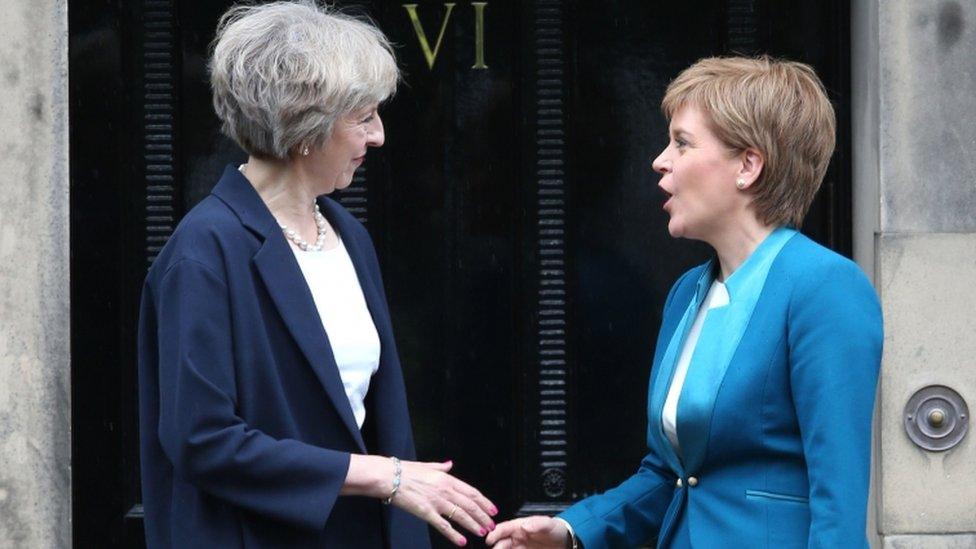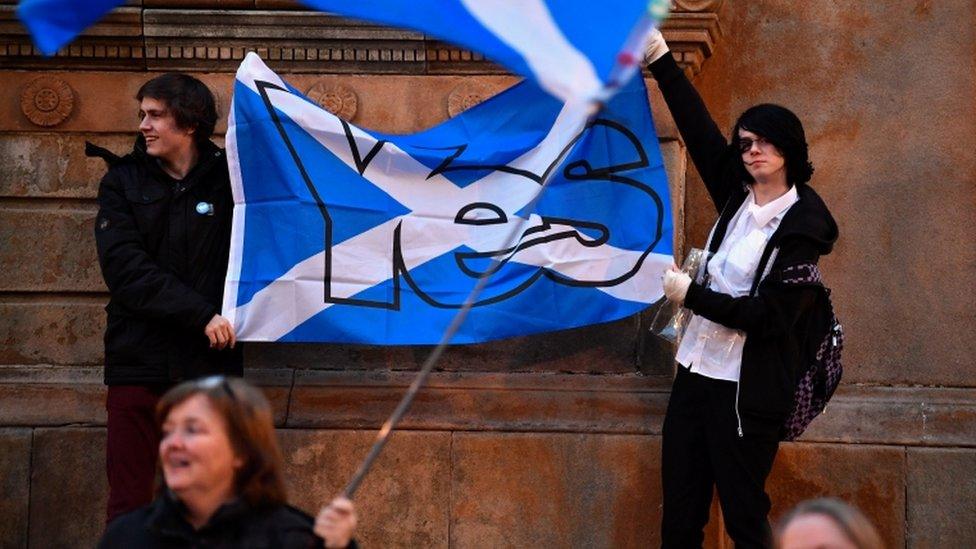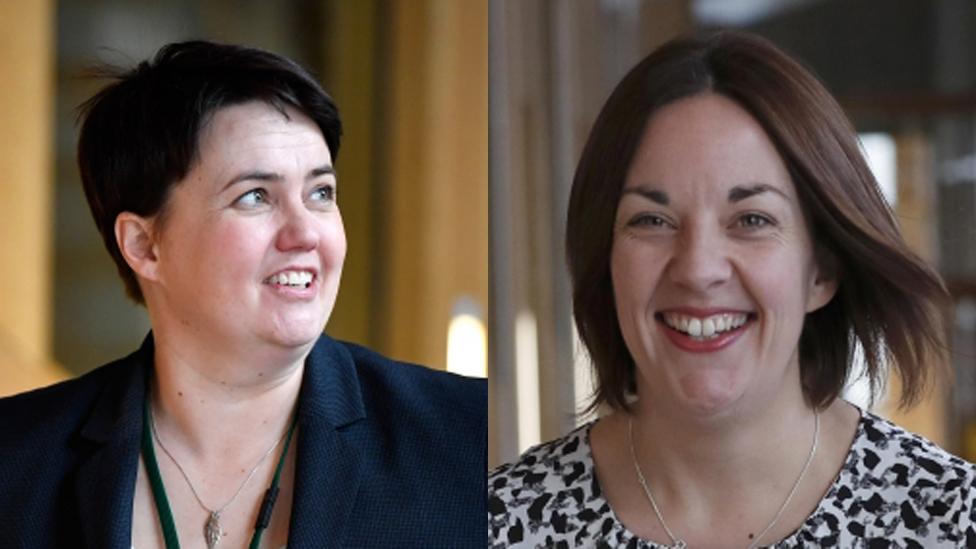Nicola Sturgeon says Scotland's future 'should not be imposed'
- Published
The clock ticks closer to MSPs backing a bid to ask Westminster to hold a second Scottish independence referendum
Nicola Sturgeon has insisted that Scotland's future should be decided by the people who live there rather than being "imposed upon us".
The first minister was speaking as she asked Holyrood to back her call for a second independence referendum.
Ms Sturgeon wants a vote to be held in the autumn of next year or the spring of 2019.
But the UK government has already said it would block the move until after the country leaves the EU.
Scottish Conservative leader Ruth Davidson claimed voters were "sick to death of the SNP's games" over independence as the pro-UK opposition parties argued that there was no appetite for another referendum just two and a half years after the first one.
Ms Sturgeon's minority SNP government is asking the Scottish Parliament to back its plans to ask Westminster for a section 30 order, which is needed to make a referendum legally binding.
The government is expected to win Wednesday's vote with the support of the Scottish Greens - despite opposition from the Conservatives, Labour and Liberal Democrats.
They argue that most people do not want another referendum, and that it will only lead to greater division and uncertainty in the country.

Prime Minister Theresa May has insisted that "now is not the time" for Ms Sturgeon to hold a referendum
Ms Sturgeon acknowledged to MSPs that many people do not relish the prospect of another referendum, but insisted that the only alternative was "simply to drift through the next two years, crossing our fingers, hoping for the best while fearing the worst."
She added: "It would mean accepting that at the end of this process we will not even have the option of choosing an alternative path, and that the direction of our nation will be decided for us.
"I do not consider that to be right, or fair. The future of Scotland should not be imposed upon us, it should be the choice of the people of Scotland."
Ms Sturgeon said the Scottish government had made a number of compromise proposals aimed at protecting Scotland from the "impact" of Brexit.
And she insisted that "had any one of these proposals been accepted by the UK government, we would not be having this debate today".
The first minister said a manifesto commitment to hold a vote on independence in the event of a "material change in circumstances" from the 2014 referendum gave her an "unquestionable democratic mandate".
And she said that attempting to block a referendum "runs the real risk of undermining the democratic process".

Opinion polls suggest voters are split over independence, and whether there should be another referendum
Ms Sturgeon added: "All of this raises fundamental questions for Scotland. If the UK government can ignore this parliament on one of the most fundamental issues that the country faces, what meaning can ever be attached to the idea that the UK is a partnership of equals?"
On the key question of timing of any vote, she insisted this should be for Holyrood to decide, as it had done in the 2014 independence referendum - when Scotland voted by 55% to 45% to remain in the UK.
But she said the UK government should "set out a clear alternative and the rationale for it" if it did not agree with her timescale.
Mr Sturgeon added: "As I have said in recent days, I am, within reason, happy to have that discussion to see if we can find common ground that I can then propose to this parliament."

Analysis
By BBC Scotland political editor Brian Taylor
There was much fevered talk of manifesto commitments and mandates during Day One of the referendum debate at Holyrood. (Or, more precisely, Day One of the demand for a Section 30 transfer of powers in order to hold such a referendum.)
However, party leaders seemed mostly keen to talk about promises delivered by their rivals - and the attendant mandates. Or their absence.
For example, Ruth Davidson of the Tories vehemently queried the right of the First Minister to be demanding Indyref2.
In the run up to the first vote in 2014, Ms Davidson recalled that the SNP had talked of a "once in a generation" opportunity. She recalled further that the Nationalists had ruled out a rerun in the absence of discernible public demand.
In response, the First Minister, Nicola Sturgeon, said it was the Tories who had created the rethink. She said it weighed heavily with her that she felt obliged to contemplate a further referendum which many didn't relish.

Prime Minister Theresa May said last week that "now is not the time" for a referendum, insisting that the focus should instead be on getting the best deal for the whole of the UK during the forthcoming negotiations with the EU.
However Mrs May, who will formally notify the EU next Wednesday that the UK is leaving, did not rule out a vote on independence being held after Brexit.
Her Scottish secretary, David Mundell, later clarified that the UK government "will not be entering into discussions or negotiations about a Section 30 agreement" during the Brexit talks, and that any request "at this time" will be declined.
The Scottish Conservatives have tabled an amendment, external calling for Holyrood to rule out a referendum before April 2019 - the month after the UK is expected to leave the EU.

Ruth Davidson's Conservatives and Kezia Dugdale's Labour will vote against a referendum being held
The party's leader, Ruth Davidson, said that most people in Scotland are "sick to death of the SNP's games".
She added: "They don't want another referendum any time soon, just three years after the last one. The SNP's plan was not actually about trying to hold a fair, legal and decisive referendum.
"It was about a well-rehearsed game to put forward unworkable proposals, wait for Westminster politicians to point that out, then rush to any nearby microphone - angry face attached - to trot out the same old tired complaints."
'Stronger together'
Scottish Labour leader Kezia Dugdale pledged that the party would "campaign with everything we have to remain in the UK".
She told MSPs: "I believe in the United Kingdom not as a symbol of past glories or purest ideology, but as a living, breathing union of nations that delivers for the people of Scotland.
Ms Dugdale also said the UK would be "stronger together, more so than we could ever be apart", and accused the SNP of wanting to "replace Tory austerity with turbo-charged austerity".
Scottish Greens co-convener Patrick Harvie said it was "absurd to suggest that we should not respond to and react to the fundamentally-changed circumstances we now find ourselves in."
Scottish Liberal Democrat leader Willie Rennie said the Scottish Parliament had been "systematically undermined by the SNP when it does not agree with the SNP", highlighting votes which he said the SNP had lost and then ignored.
The debate on an independence referendum continues at 14:40 on Wednesday.